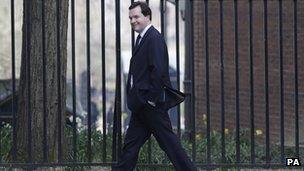George Osborne warned by MPs over mortgage guarantee risks
- Published

George Osborne's flagship scheme to boost the housing market may not help first-time buyers and could cost the Treasury large sums, MPs have warned.
The government will guarantee mortgages for three years from January where applicants can put down a 5% deposit.
The Treasury Committee warned the chancellor's plan made the government an "active player" in the market with a financial stake in propping up prices.
Labour say the plan amounts to a "spare home subsidy" to existing home owners.
Ministers aim to extend the current Help to Buy scheme to make it easier for first-time buyers or those looking to trade up to get access to home loans if they do not possess substantial equity of their own.
'Curtailing risk'
Mr Osborne has said the housing market is still not functioning properly after the 2008 financial crisis, with the number of purchases by first-time buyers down 40% in the past five years.
He has claimed the plan, now the subject of consultation, could unlock £130bn of mortgage finance.
The idea is that loans from High Street lenders for house purchases of up to £600,000 would be underwritten by the government.
If a borrower defaults on a mortgage, he or she would stand to lose their 5% deposit. Thereafter the government would have to pay just under 15% of the outstanding amount, while the lender would be liable for just over 80%.
House builders and lenders have welcomed the initiative but Labour have warned of confusion about whether it could be used to buy second homes.
But, in an analysis of the main measures in March's Budget, the cross-party Treasury Committee identifies what it says are a number of potential problems.
The committee says it is not clear what fee lenders will have to pay to take part in the scheme or how it will be structured to cover potential losses.
The MPs also warn that the Treasury will find it difficult to price the scheme in a way which "sharply curtails risk" to the taxpayer.
The Treasury could potentially face big losses on loans it has guaranteed if lenders start to act more aggressively and the number of repossessions rise.
'Damning'
The committee says it is "by no means clear" that the scheme will benefit first-time buyers.
And the chancellor's claims that boosting demand will, in time, serve to increase the supply of property were "unconvincing" in the short term.
The committee also expresses concern that the scheme could become a "permanent feature" of the housing market and insists any decision about its future should be taken by politicians rather than the Bank of England.
And it says there is a "lack of clarity" about whether people who already own a home would be excluded, arguing that it "struggles to see the rationale" of existing homeowners of any kind being able to benefit from it.
"The government's Help to Buy scheme is very much a work in progress," said the committee's chairman, Tory MP Andrew Tyrie.
"It may have a number of unintended consequences. The questions the committee has asked the government need answering."
Budget leaks
Labour said the "damning" report was "another damaging blow" to George Osborne.
"We will only tackle the housing crisis and help first time buyers if we have a major programme of affordable house building, which Labour called for as part of our jobs and growth plan but the Budget totally failed to deliver," said shadow Treasury minister Cathy Jamieson.
"And it's astonishing that one month since the Budget, George Osborne has still failed to rule out people being able to buy second homes with a taxpayer guarantee.
"First time buyers and people struggling to get a mortgage should be the priority for help, not a spare home subsidy for the small number who can afford to buy a second one."
The Treasury says this is not the point of the scheme but parents may be allowed to buy homes for their children when it is finalised.
In its report, the committee also urged the Treasury to take further action to prevent Budget leaks.
It has called for an end to the practice of officials pre-briefing sections of the media about what is in the Budget on the understanding that it is not published until the statement has been delivered.
This comes after Evening Standard accidentally published details of the key points of the Budget on Twitter before Mr Osborne had addressed Parliament.